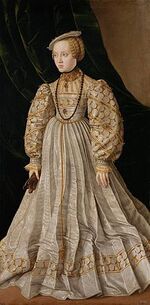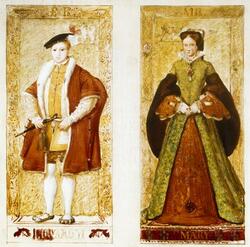-
Today in Tudor History...
7 July 1207 –Birth of Elizabeth of Hungary
1307 – Death of Edward I of England
1456 – A retrial verdict acquits Joan of Arc of heresy 25 years after her death.
1528 –Birth of Archduchess Anna of Austria

1534-Chapuys to Charles V.
Since the date of your letters of the 12th ult., which I received two days ago, your majesty will have seen by several of mine what was said here of the motions of Germany and the determination come to about the interview, which had been appointed for the middle of August, but has since been put off till Sept. 1 ; and some were lately thinking it would all be broken off, because, as the earl (lord) of Montague has sent to me to say, the king of France has sent word that they must not think when they met of treating anything against the faith, the Pope or the Holy See, because he wished to live a Catholic like his predecessors. This king is getting plate of all sorts manufactured, and all the goldsmiths are fully occupied. A man who has seen a bill of the quantity and the names of those to whom it is to be presented in France (de par dela) says that it will amount to 12,000 marks, I know not whether he means English marks of the value of two nobles each or marks of 8 oz. I believe, besides the said plate, the King will give away some of what he has already made, especially gold cups. The Queen fears that the little plate she has will go this time with her rings and jewels. As to the marriage of the king of Scotland with a daughter of the king of France, this king, as I have before written, has several times assured the Scotch ambassadors that there was an express treaty against it between him and the king of France, so that it is not to be supposed that he will consent to it. He has more suspicion of the French than he had when the said treaty was concluded, which was a little before he went last to France; and especially seeing the alliance the French king has lately made with the Pope, together with the fact that Francis has got nothing from his Holiness in favor of Henry, the making of this marriage would lead to a complete rupture. It is certain the French give the Scotch king some hope of it, to prevent the Scotch king making an alliance with your majesty. It is probable they would prefer it to be so, as they do not know a more convenient match for the youngest daughter. The Scotch ambassador declared to me that they had proposed to them that of Albret, and that it was a ruse to alienate the King his master still further from your majesty on account of the quarrel of Navarre; and that he thought his master would not on any account listen to it. The only danger would be if the Scotch king went to this meeting, as desired by those here and the French also, but I see no appearance of it as yet. I opposed it as much as possible to the ambassador. The person sent by your majesty to the king of Scots will do the rest. I am told by a Spanish sailor that he has arrived.
It is some time since the news arrived that your troops had left Coron. Various things have been said about it, to which I have replied that your majesty undertook to keep it, hoping that other princes would use it as a means of attacking the Turk; but seeing that they did not care, but some of them rather complained that your holding it would provoke the Turk to attempt something against Christendom, you had abandoned it. This language about irritating the Turk has been used to me by those here and by the ambassador of France.
On St. John's Day the ambassadors of Lubeck and Hamburg were with the King at Hampton Court, where they were very well received. On Sunday following they returned thither, and the doctor brought by those of Lubeck, who is the chief of the embassy, made a long Latin oration which lasted nearly two hours. Among other things he reviled horribly the authority of the Pope, and praised inestimably this king for many things, especially for his great learning and enlightenment from God, by which he had come to a knowledge of the truth both as to the authority of the Pope and about his marriage, and that he ought not to leave unavenged the great injury the Pope had done him in that matter. He magnified the power of Lubeck, declaring it was free, and could make alliances without regard to anyone. There is no doubt that when the King requested the Lubeckers to send hither ambassadors, he also furnished them with the matter of this oration. This doctor has played his part so well that the King has presented him with a great reward to remain here in his service, which perhaps he will accept.
He is a native of High Germany, though he lives at Lubeck. The ambassadors were also to have brought another doctor, whose learning and persuasive power they extol above Melanchthon's, but on his departure he fell ill. But being recovered, the ambassadors, I understand, have promised to bring him over to convert those who impugu the last marriage, and who make a difficulty about entering the Lutheran sect. They take it upon them that the said doctor will speak to no one but he will convert him to his opinion. It is not known that the said ambassadors have yet treated of any affairs with those here, and doubtless they will treat nothing against your majesty directly, but indirectly they will make some agreement to defend this king against the Pope and all others who might make war upon him on account of religion, or for execution of the sentence in favor of the Queen.
Although the earl of Kildare is so ill, both in brain and body, that he can do nothing either good or evil, he was apprehended eight days ago and taken prisoner to the Tower, where I am told he would have been put long ago as soon as he arrived here, had it not been that the King always hoped to bring over and entrap his son, a young man of bold and valiant spirit, who has great influence in Ireland; but he has not only refused to come, but has even mustered men and seized artillery belonging to this king, besides other things, of which your majesty will be more surely informed by the person you have sent into Ireland, who I am told had arrived 10 days ago. It is reported that the earl of Desmond has joined the said son of Kildare. Three months ago the provincial of the Cordeliers Observants, going to Ireland to visit his convents, promised me that he would brew there all he could for the preservation of the authority of the Holy See, in which he may do wonderful service, especially among the Wild Irish, by whom these Cordeliers are feared, obeyed and almost adored, not only by the peasants but by the lords, who hold them in such reverence as to endure from them blows with a stick. The men in that quarter being such as your majesty knows, it will be necessary to exhort them continually, and comfort them with some aid, at least to keep them in good hope. Ireland is of no little importance, especially considering its vicinity to Wales, which forms the chief strength of England, and they require only a chief to do as the others do. They have news in Court that the said son of Kildare, or some of his men, had boasted they would have the aid of 12,000 Spaniards; at which, I am told, the King and his Council were much troubled, and some think if these tumults be not appeased, the interview will be broken off; in which case the King might take offence, even at warlike appearances in Spain. It is incredible what pleasure all the people would have at such news. It is some time since the King appointed master Skeffington, master of the artillery, to be governor of Ireland in place of Kildare. He formerly had some charge in Ireland, but some think he will not go thither, for his secretary three days since was committed to the Tower on account of some letters from Ireland. The Lubeckers, perhaps to gratify the English, have been complaining that the Hollanders have broken the truce by sending six ships to some port in Norway, whereas they were not entitled to send more than two or four.
On receipt of the above-mentioned letters of your majesty I immediately informed the Queen, who was marvellously consoled to hear of your prosperity and the care you had of her affairs and those of the Princess. She has sent to me again, as she does almost daily, to desire that above all things I would endeavor to get leave to visit her, but with all my importunity I have never yet been able to get an answer. I do not write at present the language they have used to me about this matter. London, 7 July 1534.
1537 - Death of Madeleine de Valois also known as Magdalene of Valois, was a French princess who became Queen of Scots as the first spouse of King James V of Scotland.

1553 – Robert Reyns informed Mary Tudor of the death of her brother King Edward VI

1585 – Birth of Thomas Howard, 14th Earl of Arundel, 4th Earl of Surrey, and 1st Earl of Norfolk
